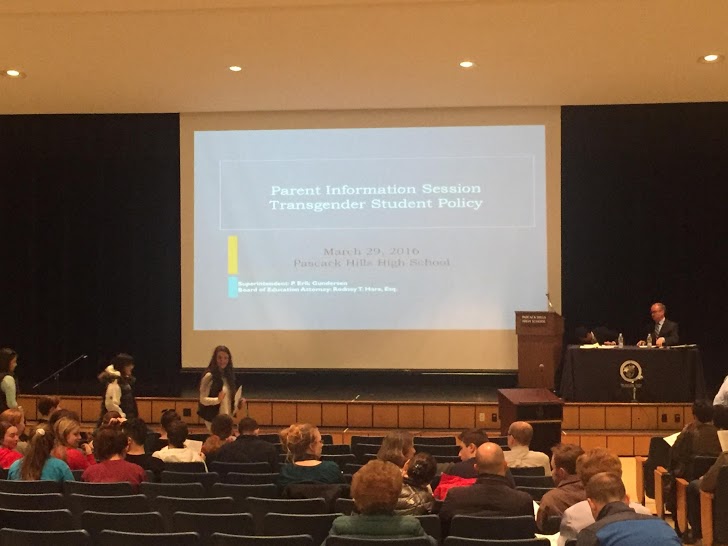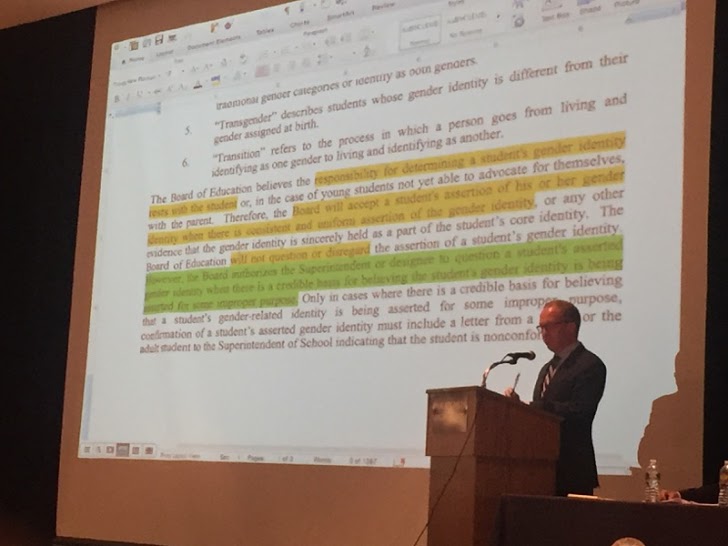Superintendent Mr. Erik Gundersen outlines the key points of the policy at the meeting last night.
Administration holds info session about proposed transgender policy
Superintendent answers questions and reviews policy protecting the rights of transgender students
Last night, superintendent of schools, Mr. Erik Gundersen, and the Pascack Valley Regional High School district’s attorney, Mr. Rodney Hara, reviewed the proposed transgender policy at a parent meeting.
The Board of Education will officially vote on the issue at their upcoming meeting on April 4 in the auditorium of PV at 4 p.m. Provided that it is approved for a second hearing, the policy will be heard again on April 11 at 7:30 at the same location.
The meeting was planned to be held in the media center, but it was moved to the auditorium when the number of people in attendance rose. There were several students and faculty members in attendance alongside the parents. Though the time allotted for the informational meeting was only an hour, the session ended up running an extra hour.
Gundersen started with a brief introduction, emphasizing that comments arguing for or against the adoption of the policy should be made at the Board of Education meeting on either April 4 at 4 p.m. or April 11 at 7:30 p.m. at Pascack Valley High School. Afterward, Hara addressed the legal backing of the policy and Gundersen went over the actual proposed policy.
“It’s tremendously important to have something in place,” said Hannah Simpson, a transgender woman and a 2003 Pascack Valley alumnus, “that affirms the rights of transgender students, that protects us, and that helps people realize that this is a natural phenomenon within the course of humanity.”
Transgender is a term labeling those who identify with a gender other than the sex they were assigned at birth.
The proposed policy addresses a transgender student’s rights in the Pascack Valley Regional High School district. The policy outlines four basic points:
- Transgender students will be allowed to use the bathroom or locker room of their identified gender if they so choose. If they are uncomfortable with either gender’s facilities or are identified as a non-binary gender, meaning a gender that does not fit male or female, accommodations will be made.
- Transgender students will be addressed by their preferred names and pronouns in the school district.
- Transgender students’ names and pronouns will be listed as preferred when being used for unofficial purposes, such as attendance. When official documents are required, the listing of the individual’s legal name and gender cannot be modified without a legal change.
- Transgender students will be allowed to play sports and participate in physical education with members of their identified genders.
The full policy can be found here.
Charlie Leppert, an agender senior at Pascack Valley, attended the informational meeting last night. Agender means that the person does not identify with a gender, and Leppert prefers the pronouns they/them/their when being addressed. More information about the rising use of non-binary pronouns can be found here.
“I had my worries because of the recent anti-LGBT legislation like in Kansas and North Carolina,” Leppert said. “But I actually think the policy is really good. It does well in balancing affirming trans people’s identities and making sure no one abuses that affirmation.”
The meeting ended with an hour long Q&A session.
Hara presented the laws upon which the proposed policy was built, justifying the legality of the points. The main federal laws brought up in support of the policy were Title VII and IX from the Office of Civil Rights of the US State Department of Education, both of which essentially state that no one will be discriminated upon based on sex. Though sex is cited specifically, the titles are interpreted to include gender, which is a characteristic qualifier rather than a biological one. New Jersey’s Law Against Discrimination and the Anti-Bullying Bill of Rights Act were brought to attention as well; both prohibit discrimination based on sex and gender identity. Other similar laws were stated.
“The most important thing is knowledge,” Hara said. “Preconceived notions and beliefs are understandable but cannot transcend your obligation to the school district to respect the rights of the students.”
Court cases across the country were also cited, showing the indecisive stance that different areas of the country have taken in addressing transgender policy.
After Hara went over the law throughout the state and the country, Gundersen addressed the main points of the transgender policy and clarified some of the language in the policy itself. He addressed the fear of misuse of this policy, which will be avoided by the “case-by-case” approach that the Board of Education will take in addressing a student’s gender.
The Q&A addressed parental concern for the comfort of cisgender, or someone whose gender identity aligns with that of the gender assigned at birth, students as well as the issue of parental involvement.
A clause in the policy states that parents may refute the student’s identity. It was made clear that the Board would align with the student’s wishes in such a scenario. It was also made clear that all staff and personnel would be required to consult the student before relaying any information of the gender change to their parents.
The opposing concern was that parents do not have enough say in the new policy.
“I would not give to a student or minor something I feel belongs in a parent’s hands,” a woman at the meeting said.
A few parents at the meeting were concerned that their children may not be comfortable with using the same public locker rooms as transgender individuals, stating that they themselves were uncomfortable with it as well.
“A transgender student has the right to utilize their newly identified restroom and locker room,” Gundersen said in response. “However, if there is a student who feels that they don’t want to change in that facility, then that student can approach the administration and we can find an alternate location for them to change. ”
Parents also feared that their children would be unsafe, stating that a cisgender student may attempt to take advantage of the new policy. Gundersen asserted that “consistent and uniform assertion of the gender identity” must be demonstrated for the transgender policy is applicable to a student will prevent misuse of the proposed policy and any actions not in compliance with the policy would result in concordant penalties.
Assemblywoman Holly Schepisi, who has a child in the district, was in attendance and aired concerns that the Board may have trouble balancing understanding of a transgender student’s situation and privacy.
Simpson was concerned that a student’s gender identification on working papers may interfere with the likelihood of being accepted for a job. Gundersen was unsure of whether the school would be required to provide official information to employers.
“The fact that they’re working on a case-by-case basis is definitely taking a step in the right direction,” Simpson said. “This policy has the potential to save lives.”

